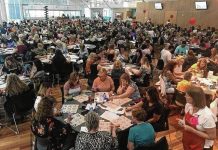Of all Betty Freeman’s qualities, the one I will miss most is her smile. It can be described in many ways — gentle, sometimes even boisterous — but the recipient always knew it was genuine.
There were times when I could see a twinkle in her eyes. That twinkle will now only be in my memory. Betty died Jan. 27 at an assisted living facility in Newburgh.
She had been living in the small town near Evansville for the past seven years. She had moved there from Bartholomew County following the death of her husband, Harry, in 2007 so that she could be close to family.
Actually, Betty had a lot of family, many of them here in Bartholomew County, but most of her “relatives” didn’t share her blood line. The majority were people who encountered her through her work with the American Red Cross.
Betty worked on the staff of the local chapter for 30 years, from 1968 to her retirement in 1998. That span was only part of her association with the organization. It began shortly after the end of World War II when she began a career in volunteering.
She performed many jobs with the Red Cross, but she never directed a local chapter nor did she aspire to that kind of status. Funny thing is that most people who encountered her had trouble differentiating between Betty and the Red Cross. To them, they were one and the same.
Columbus retiree Gordon Lake came to know her qualities through the numerous blood drives she helped organize and in which he repeatedly participated as a blood donor. “I will always remember her smile and the way she treated people,” he said. “She made giving blood fun.”
She had a down-to-earth quality in all her dealings. Richard Yeaton laughed about their relationship when he was director of the local organization. “Every now and then I’d say or do something that Betty didn’t think was right,” he recalled. “She’d just look up and tell me to go to my room.”
I suspect, though, that those who remember her most kindly are those she helped. When she retired, she recounted some of her experiences in providing aid that went beyond material things. There was the time several years ago when she learned that a young wife living in Taylorsville was trying to cope with the deployment of her husband to an overseas assignment with the military.
“I called her on the phone at something like 11 o’clock at night to see what we could do to help,” she recalled in an interview several years ago. “Right from the start she talked about killing herself. We kept talking, and I tried everything to show her how wrong that would be. I think I was on the phone nonstop with that young girl until dawn the next day. I hope I helped her a little.”
She felt more than empathy for those she helped. There was the mother of a soldier who had been killed in Vietnam, for instance. “We were available to help the families make arrangements for the funerals,” she said.
“I remember one mother who didn’t have a dress suitable enough for a funeral and couldn’t afford to buy one. I helped her with the arrangements and arranged for her to buy a dress, but I couldn’t escape the irony of a woman sacrificing her son for the country, but she couldn’t afford to buy a dress for his funeral.”
And then there were the humorous moments. “We got a lot of calls from mothers of children in the service who wanted us to do something about helping make contact with them because they didn’t write home,” she said. “It’s a pretty routine procedure in which we contacted the Red Cross chapter near the base where the child was stationed, and they contacted the soldier’s commanding officer.
“The funny thing is that I had a similar problem with my own son, so I just followed the procedure. It really worked. The night after I submitted my request to his base commander, I got a call from my son, and he begged me never to do that again. His superiors had called him into the company headquarters and made him sit on the floor and write a letter to me. I agreed on the condition that he promise to keep writing. He was pretty good after that.”
Even in retirement, Betty was true blue Red Cross. At the age of 85 she asked if she could come into the offices of the Evansville chapter of the Red Cross to help stuff envelopes.
There is no way of counting the people that Betty helped over the years. I suppose one measure would be in the framed collage of Red Cross pins she had received over her half century-plus association with the organization.
During her envelope stuffing stint at the Evansville chapter, she expressed hope that the collection could be put on display at the Atterbury-Bakalar Air Museum in Columbus. If that comes to be, I hope the collection will be displayed alongside a photo of Betty — smiling.
Harry McCawley is the former associate editor of The Republic. He can be reached at [email protected].




